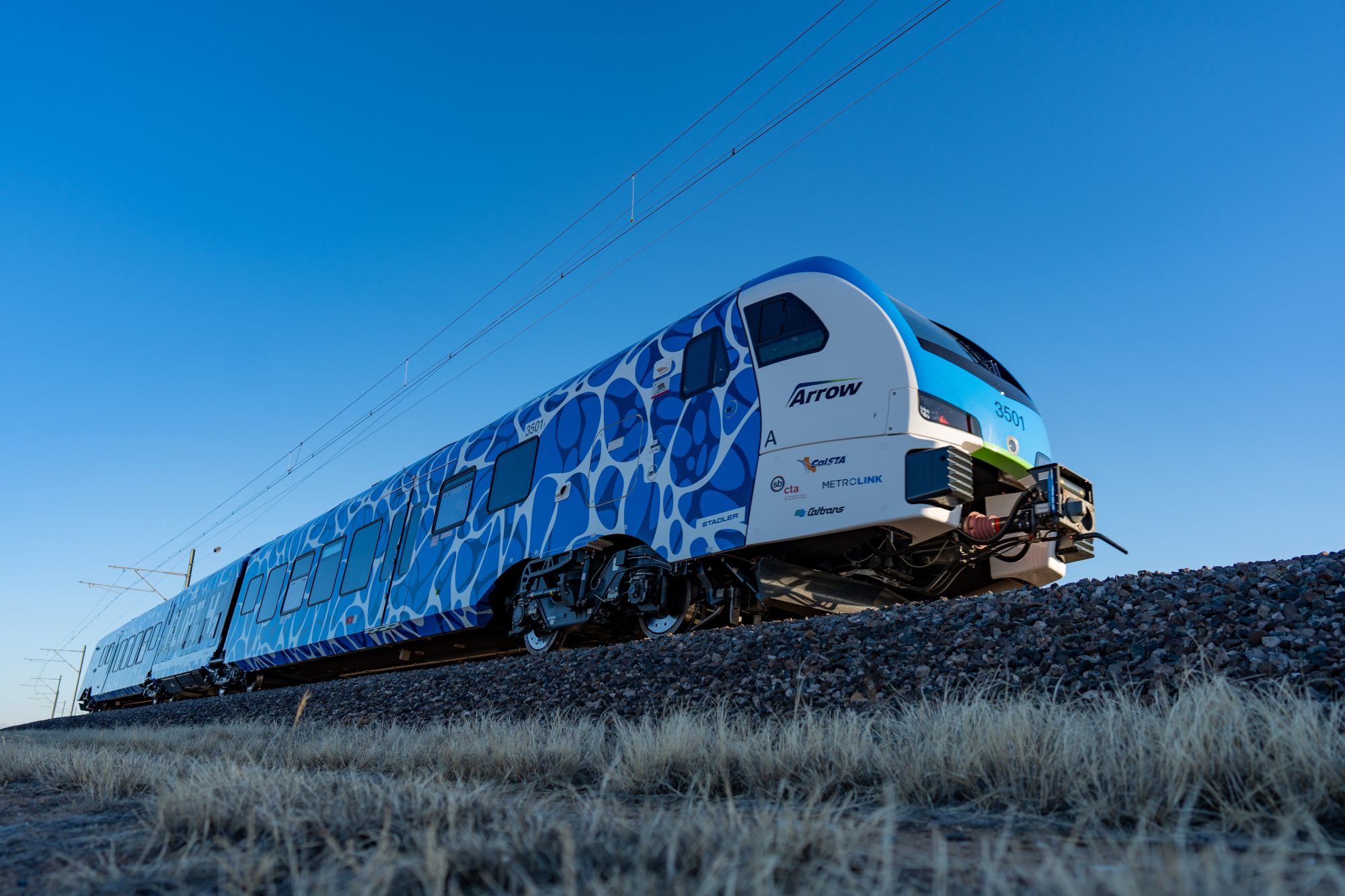Stadler’s hydrogen-powered train FLIRT H2 achieves a new Guinness World Records title

Stadler is proud to announce that the FLIRT H2 has been entered into the Guinness World Records database for the longest distance of 1,741.7 miles (2,803 kilometers) achieved by a pilot hydrogen fuel cell electric multiple unit passenger train without refueling or recharging. This achievement underlines Stadler’s innovative strength and technological leadership in the field of sustainable rail transport. Innovation has always been one of the core factors contributing to the company’s success and the entry in the Guinness World Records database marks another exciting highlight that proves the FLIRT H2’s capabilities and its pioneering technology.
Stadler had the honor of presenting the FLIRT H2 to the public for the first time at InnoTrans 2022 in Berlin. A significant number of detailed solutions were developed to integrate fuel cells and hydrogen storage systems into the modern FLIRT commuter train product line. These solutions have since been tested thoroughly, first in Switzerland and more recently on a dedicated test ring in Colorado in the United States.
Close to completion of testing, the company was eager to prove the reliability and capability of this innovative train. To do so, an attempt to set a new records title for the range of the hydrogen train without refueling or recharging was undertaken under the close watch of the Guinness World Records adjudication team.
Dr. Ansgar Brockmeyer, EVP of Marketing and Sales at Stadler said: “This world record establishes the ideal performance range of our hydrogen version of the best-selling FLIRT Electric Multiple Unit, the FLIRT H2. This is a monumental achievement from our entire team and we are very proud to hold another record title.”
Martin Ritter, CEO Stadler US Inc. said: “Stadler is consistently focusing on the future of rail transportation with alternative drive systems by continuously developing innovative technologies. By using hydrogen as a clean energy source, we are actively contributing to
environmental protection and shaping the sustainable and zero emission travel of tomorrow.”
The world record journey started in the evening of March 20, 2024 where the train set out for its first laps around the test track. The team of engineers from Stadler and ENSCO continued driving the vehicle in shifts throughout the night and following day and concluded the successful attempt at 5.23 p.m. (MST), on March 22 , 2024 (at 12.23 a.m. CET, on March 23, 2024). Altogether, the train travelled 1,741.7 miles (2,803 kilometers) for over 46 hours on one tank filling.
With this, Stadler’s FLIRT H2 officially holds the world record for the longest distance travelled by a hydrogen-powered passenger train without refueling or recharging. The record attempt was made at the ENSCO test center in Pueblo, Colorado where the vehicle had undergone its type test procedure. Detailed records before, during and after the world record attempt were kept to ensure precise and transparent evidence is established.
The FLIRT H2 for San Bernardino County Transportation Authority (SBCTA) is Stadler’s second Guinness World Records title winning train with alternative propulsion. In December 2021, the FLIRT Akku, the battery-powered FLIRT model, set the world record for the longest journey with a battery multiple unit in pure battery mode, covering 224 kilometers in Germany.
There is great international interest in sustainable public transportation. Stadler’s FLIRT H2 hydrogen train has been well received on the market. In addition to a recent order of further hydrogen FLIRT for California, Stadler is the first train manufacturer in the world to produce narrow-gauge hydrogen trains. In Europe, the Italian railroad operators Ferrovie della Calabria (FdC) and ARST have already redeemed options, which means that Stadler is contracted to now supply a total of 15 hydrogen-powered vehicles in Italy.
About the FLIRT H2
Stadler’s alternative drive solutions make rail travel more environmentally-friendly, even in places where there was previously no alternative to diesel. Stadler is develops hydrogen powered rail vehicles to allow for emission-free operation on routes without overhead lines.
The first Stadler FLIRT H2 was designed and built for SBCTA and consists of two electrically powered end cars and a power pack in the middle. This power pack contains the fuel cells and hydrogen tanks. The fuel cells convert hydrogen into electricity. This electricity is sent to a traction converter. The battery then supplies the drive of the vehicle with the power required at any given time. This configuration also allows for recuperation of brake energy back to the battery. Therefore, the battery stores both braking power and power from the hydrogen cells. Thanks to Stadler’s innovative propulsion solution, the FLIRT H2 is able to operate all day without refueling. The train offers seating for 108 passengers and additional generous standing room. The maximum speed is 130 km/h (79 mph). Furthermore, the train is designed to handle operation in high ambient temperatures of up to 120 degrees Fahrenheit (49 degrees Celsius).
In 2023, Caltrans, the Transport Authority of the State of California, has ordered four FLIRT H2 and executed an option for another six FLIRT H2 in early 2024. These trains will have a higher passenger capacity than the ones for SBCTA and consist of four cars and a power pack in the middle car.
With ground-breaking developments in the US and the successful sales of rail vehicles with battery or hydrogen drive in Germany, Italy, Austria and Lithuania, Stadler once again underlines its leading position worldwide in the field of alternative drive solutions for rail transport.
